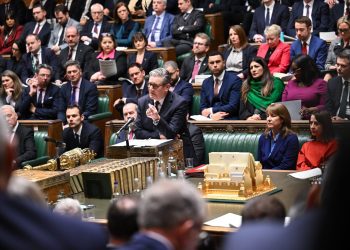The below content first appeared in Politics.co.uk’s Week-in-Review newsletter, sign-up for free here and never miss this article.
Nigel Farage asked his first question of Keir Starmer in the House of Commons on Wednesday. Depending on one’s view, the episode was either profoundly totemic or politically trivial.
From the Reform perspective, the exchange was the first commons scrap between the sitting prime minister and his eventual successor. Farage, the self-styled real “Leader of the Opposition”, was granted a chance by the Speaker to put his status claims to the test. After the next election in 2029, Farage hopes it will be him fielding questions at the government despatch box.
But even if you don’t believe the grandiose and frankly eccentric stories Farage tells about himself, it’s impossible to deny that the Reform-Labour dynamic will be a significant theme over the coming years. Last election — as the Conservatives repeatedly warned — Farage proved a key enabler of Starmer’s seismic victory. The dissonance between Labour’s 34 per cent of the vote and 174 seat majority can be explained, in part at least, through the prism of Reform’s presence.
But Farage has made no secret of his intentions this parliament. After winning the constituency of Clacton, securing a parliamentary fiefdom at his eighth attempt, the Reform leader pledged he would soon be “coming for Labour”. Indeed, having finished second in 89 seats won by Labour on 4th July, Farage thinks he is perfectly positioned to exploit Starmer’s electoral precariousness. A rising Reform tide, Farage reckons, could soon wash away Labour’s “monumental sandcastle”.
As such, it’s clear what Farage coveted above all in his first commons tussle with Starmer. He wanted a moment — a symbolic exchange that could encapsulate Reform’s threat to Labour across its heartlands, new and old. More broadly, Farage planned to implicitly challenge Starmer’s claim as prime minister to speak on behalf of the British people. Only he, according to Reform mythos, can authentically articulate Britain’s national voice.
In some senses then, Farage succeeded. Rising from the green benches, flanked by his fellow Reform MPs, Farage noted the “extraordinary celebratory scenes outside Britain’s prisons” on Tuesday following the initial implementation of the government’s early release scheme.
“This to make way for, yes, rioters”, the Reform chief added, “but equally, those who have said unpleasant things on Facebook and elsewhere on social media”. He closed: “Does the prime minister understand that there is a growing feeling of anger in this country that we are living through two-tier policing and a two-tier justice system?”
Farage’s question was greeted — pretty predictably (and crucially by design) — with a baying chorus of groans and jeers. Shouts of “Shame!” emanated from the government benches. There it was: audio evidence of the elite conspiracy Farage’s followers so disdain.
“Listen to the Westminster establishment’s scorn”, Reform’s official X/Twitter account later commented. Or as Farage himself tweeted: “Establishment MPs can heckle me all they like, but the British people are angry that we are living through a two-tier policing and justice system.”
And that was all before Starmer had gripped the despatch box to respond.
***Politics.co.uk is the UK’s leading digital-only political website. Subscribe to our daily newsletter for all the latest news and analysis.***
Labour vs. Reform versus Tory vs. Reform
The political relationship between Labour and Reform, suffice it to say, is straightforwardly adversarial. But it warrants stating nonetheless — as it marks a stark change from the dynamic forged between the Conservative Party and Farage over the last decade, which effectively dictated the latter’s rise and the former’s fall.
Farage famously revelled in this dynamic, toying with the Tory Party at its annual conference in 2023 and at other relevant events — officially in his capacity as a GB News “journalist”. In the end, Rishi Sunak’s refusal to rule out Farage’s return to the Conservative family only bolstered his political credibility.
Starmer, simply put, faces no such dilemma. It means that the prime minister, unlike his predecessor, should have no issues in stridently rebuking Farage, especially on an issue so controversial as “two-tier policing”.
Why, then, did Starmer not even reference Farage in his reply, let alone dismiss the substance of his question as a fringe conspiracy theory? Why turn instead to Sunak, whom Reform and Labour jointly vanquished in July, to accuse him of “breaking the prison system”?
The prime minister’s 160-word “answer” ultimately made no mention of Reform policy, “two-tier policing”, Farage’s commentary on the riots or indeed Farage himself. The comeback was hardly worthy, you might say, of this inaugural clash of the political titans.
But in many senses, this was a strategically sound decision. Starmer’s team will recognise that Farage has far more to gain and Labour rather more to lose from a commons stand-off. As such, Starmer duly denied Farage and his coterie of media supporters what they desire above all else: a culture war brawl.
***Politics.co.uk is the UK’s leading digital-only political website. Subscribe to our daily newsletter for all the latest news and analysis.***
Why Starmer aired Farage
One great flaw of Rishi Sunak’s premiership was that the ex-PM didn’t merely misunderstand politics, but the nature and meaning of his power as prime minister.
Nigel Farage, meanwhile, is the lead spokesperson of a band of five MPs — a frankly puny parliamentary force. According to House rules, this means the Reform leader will be granted scant opportunity to question Starmer directly on a subject of his choice, or any other for that matter.
Moreover, on those rare occasions when the commons spotlight does fall on Farage, Starmer will be right to deny him his moment. For all intents and purposes, the prime minister should treat Farage’s pointed attacks as he would those of an uppity Tory backbencher looking to make a name for themself in the national frame.
In the commons, Farage has effectively lost control of his most potent strength: his sense of timing and suspense. He will only chime in when Mr Speaker so pleases — and it is well within Starmer’s right as PM to engage with sparing enthusiasm. (Sunak, conversely, always felt compelled to respond).
This points to a wider strategy, in the short term at least, as Labour attempts to contain the Reform peril.
In sum, it’s an approach forged in conscious renouncement of the Conservative Party’s repeat failures to neutralise Farage since 2010. Reform’s rise last election, as has been well-documented, was the latest turn in a doom spiral of Conservative placation, replication and ultimately validation of Reform-style politics.
Under Sunak especially, the Conservative Party abandoned simple governing for governing’s sake to prioritise a more pressing objective: ensuring Starmer feels as uncomfortable as politically possible. But at every turn, the then-PM failed to account for the prominence of Farage — whose main shtick in recent years has been to hijack the Conservative Party’s arguments and weaponise them as part of a narrative of betrayal.
This is what it means to challenge Farage at his own game: he is both participant, referee and judge. In the end, the Reform leader — ringmaster of the right — proved so successful in getting his Tory adversaries to dance to his tune that they forgot he was an adversary. A populist pied piper, he marched the Conservative Party to and from issues and, eventually, off an electoral cliff edge.
***Politics.co.uk is the UK’s leading digital-only political website. Subscribe to our daily newsletter for all the latest news and analysis.***
The political fallibility of Nigel Farage
That said, there’s an arguably more practical political logic to Starmer’s approach here. There is, after all, plenty of evidence to suggest that Farage will make his own mistakes this parliament — ones owed to forces far beyond Labour’s control.
During the election campaign, Reform’s insurgency often found itself stalled by damaging revelations and unforced errors. Farage himself was criticised for suggesting the West “provoked” Russia’s invasion of Ukraine by expanding the European Union and NATO military alliance eastwards. It was a conversation that, at best, distracted from Reform’s central election pitch and, at worst, turned potential voters away.
Then, a Channel 4 News exposé filmed Reform activists in Clacton making racist and homophobic remarks, with one referring to the prime minister using a racial slur. Reform candidates up and down the country, meanwhile, won national headlines for conspiracy-laden comments — including Ian Gribbin, the party’s candidate in Bexhill and Battle, who was reported to have claimed Britain would be “far better” if it had “taken Hitler up on his offer of neutrality”.
At the time, Farage dismissed his candidate controversies as natural, if regrettable, growing pains. But since the election, the Reform leader has shown that he remains — in spite of it all — a genuinely fallible politician.
For instance, Farage’s popularity took a notable dent during the unrest in July, after he was accused of encouraging some of the early online misinformation — comments he later blamed on internet misogynist Andrew Tate. His favourability ratings resultantly tumbled among both “Leave” voters in the 2016 EU referendum (-11) and Conservative voters (-9), according to YouGov. Needless to say, these are constituencies Reform really needs to be advancing in if it is to secure future successes.
These figures suggest Farage’s stance on the riots was a political error and, therefore, beg further questions of his decision to double down on “two-tier policing” on Wednesday. If Reform’s political soft underbelly, as I have stated before, is its potential to be associated with extreme viewpoints and actors — Farage may well be falling into a trap of his own making.
At the last election, Reform deployed social media as part of an effective communications strategy, bypassing mainstream outlets and employing novel means to appeal to (mainly young) voters.
As a result, Reform today is an online juggernaut — with its official accounts and those of its spokespeople often accruing engagement beyond that of leading Labour politicians. But it presents a long-term challenge for Farage: if Reform continues to pander purely to the Very Online right, it risks becoming the political wing of the UK’s keyboard warriors.
Labour’s Reform strategy
That said, there remain risks for Labour in leaving Farage to his own devices. So far this parliament, Reform appears to be learning from past mistakes and duly professionalising all of its political, policy and campaign operations. An in-house candidate vetting team is reportedly top of the agenda.
Meanwhile, Reform’s parliamentary “bridgehead” could bolster its credibility in by-elections and council contests. That is without mentioning possible Conservative defections that could see Reform’s caucus grow beyond 5.
As such, there will be moments for Starmer to forthrightly take on Farage. But Labour must be ever wary of prioritising short-term gain and social media kudos over long-term strategy. That was Rishi Sunak’s defining mistake last parliament — and one Farage risks running too.
On top of this, there is no escaping the fact that — despite Farage’s fierce certainty — the nature of the Reform-Labour dynamic remains fundamentally unclear. The dust is still settling on the last election and Labour strategists, notably in the Starmerite think tank Labour Together, will be combing over the results. As such, the prime minister — at this stage at least — is right to bide his time and refuse the Reform bait.
But over the longer term, Farage will continue to crowd out his controversies with confected rows on inherently favourable terms. Then, as now, Starmer would do well to tread lightly.
Josh Self is Editor of Politics.co.uk, follow him on X/Twitter here.
Politics.co.uk is the UK’s leading digital-only political website. Subscribe to our daily newsletter for all the latest news and analysis.
The post Week-in-Review: Why Keir Starmer is refusing to take the Reform bait appeared first on Politics.co.uk.

































